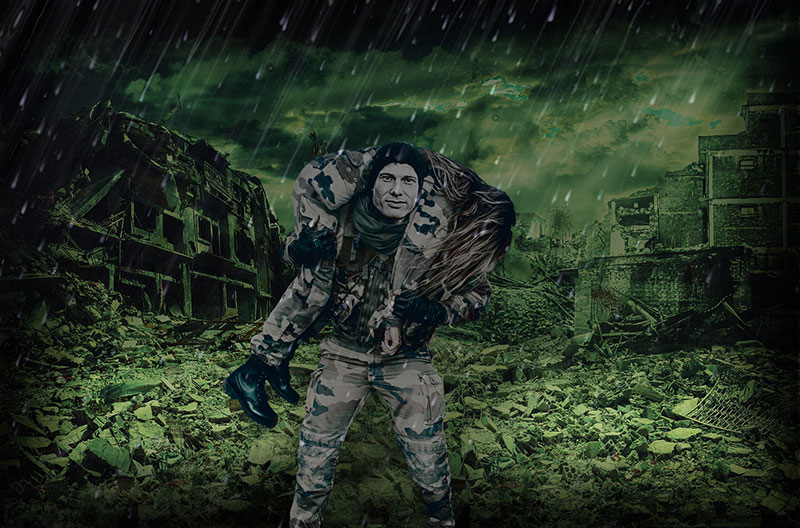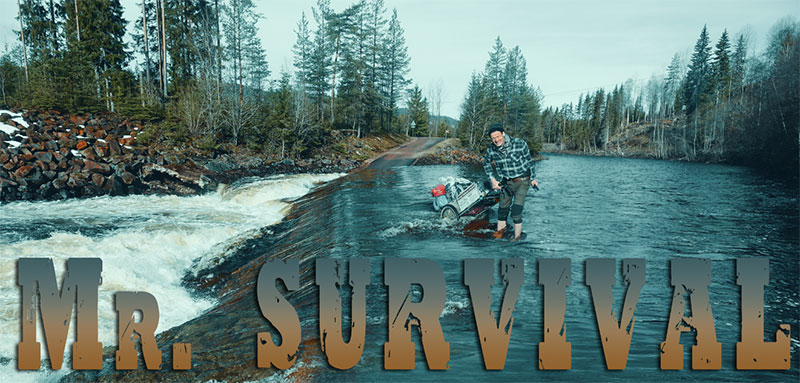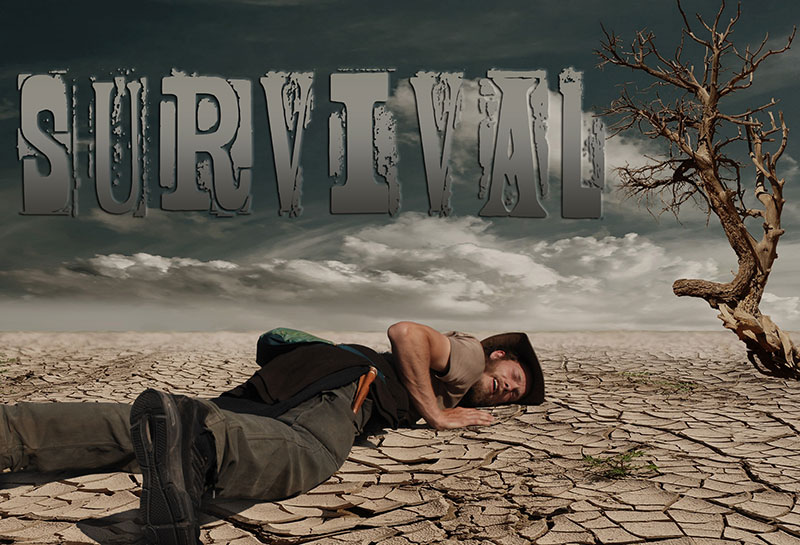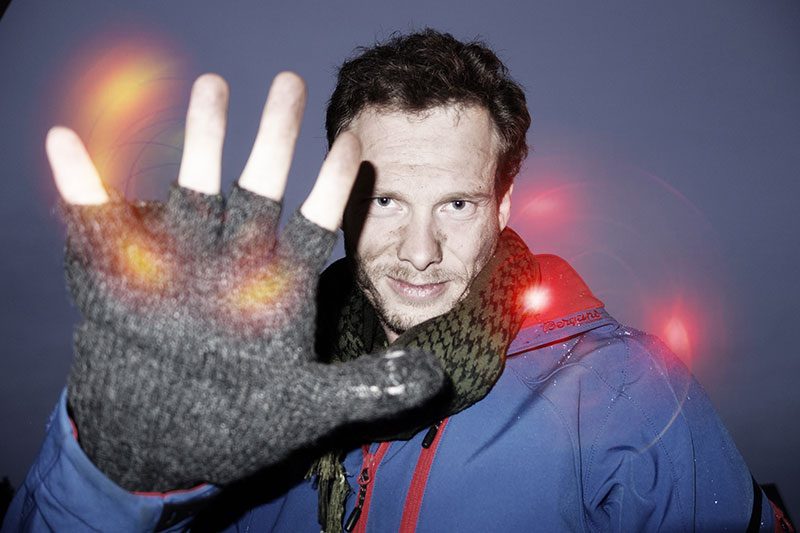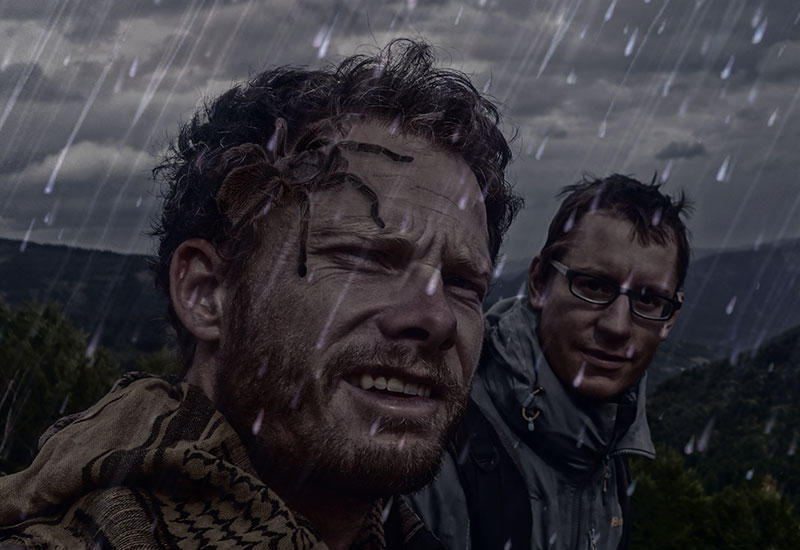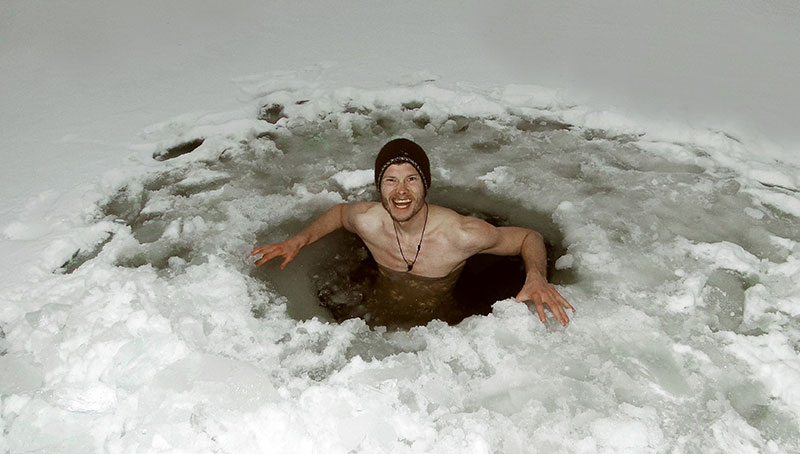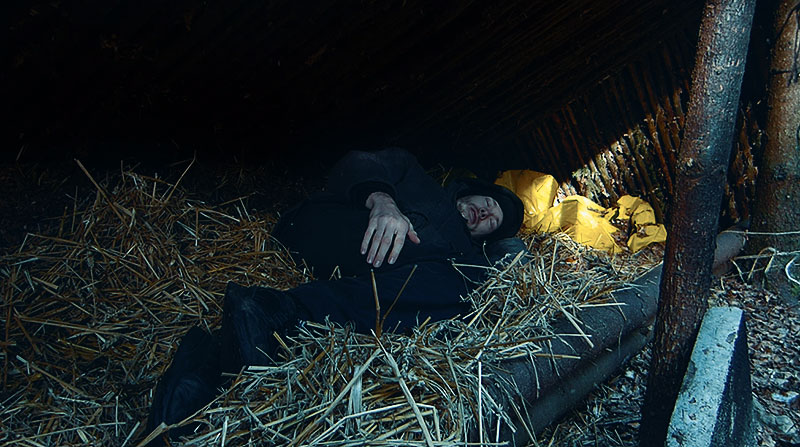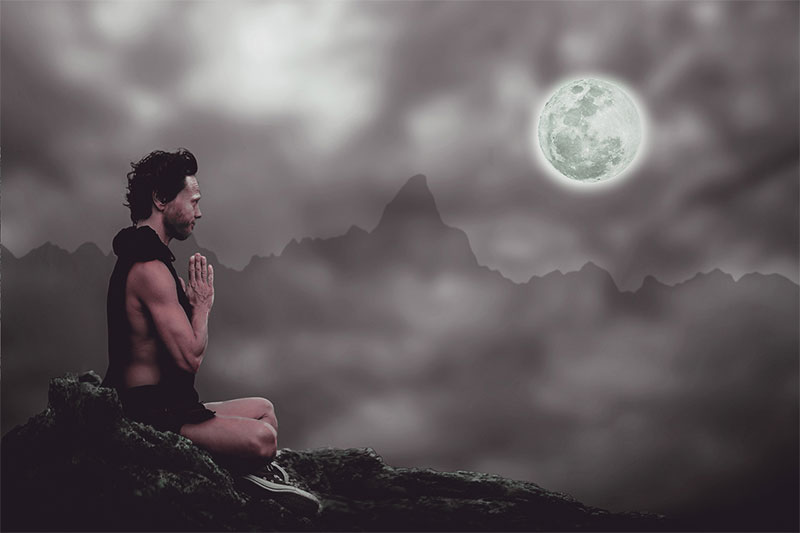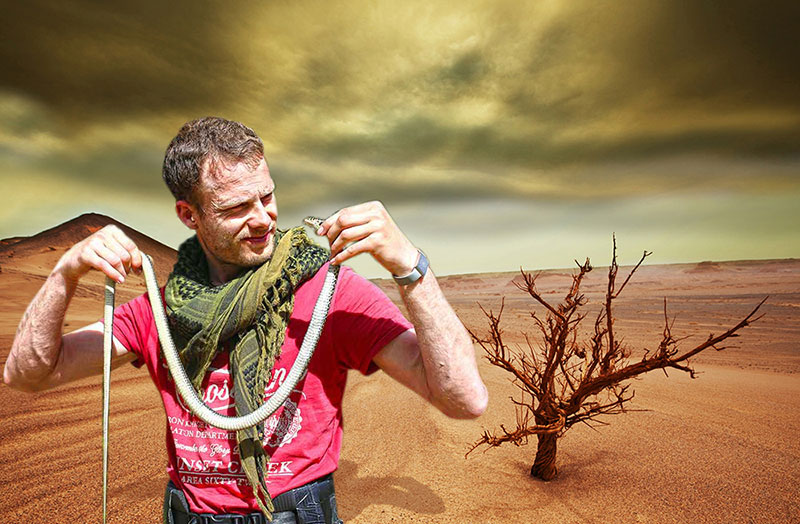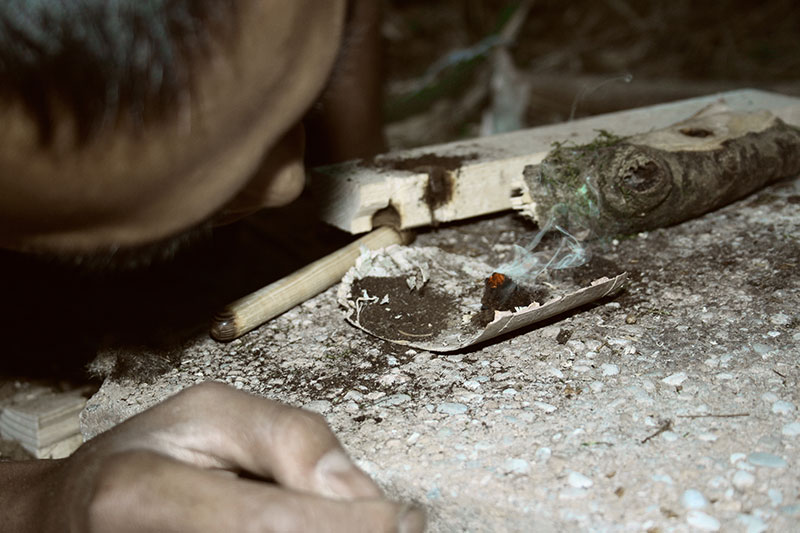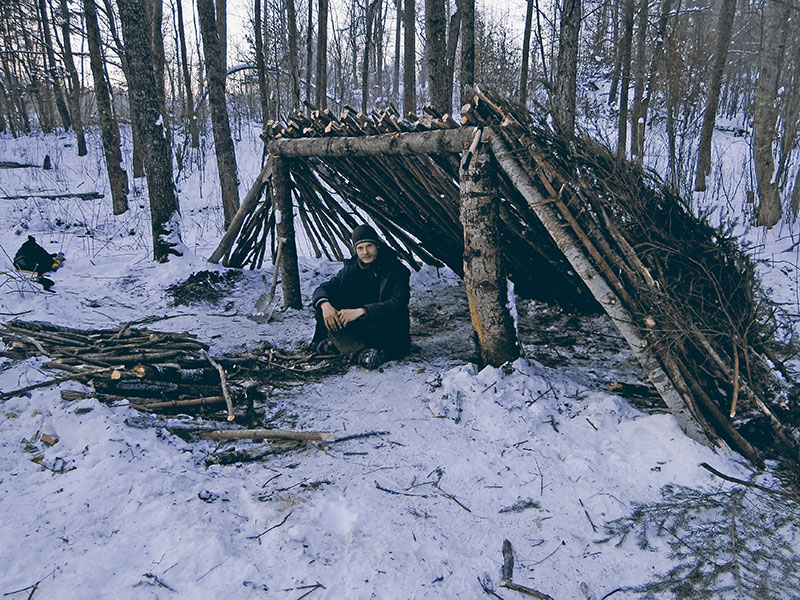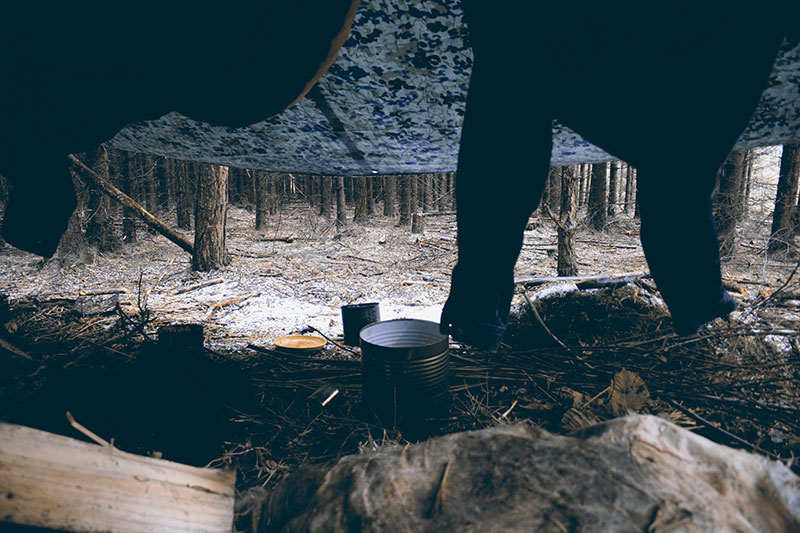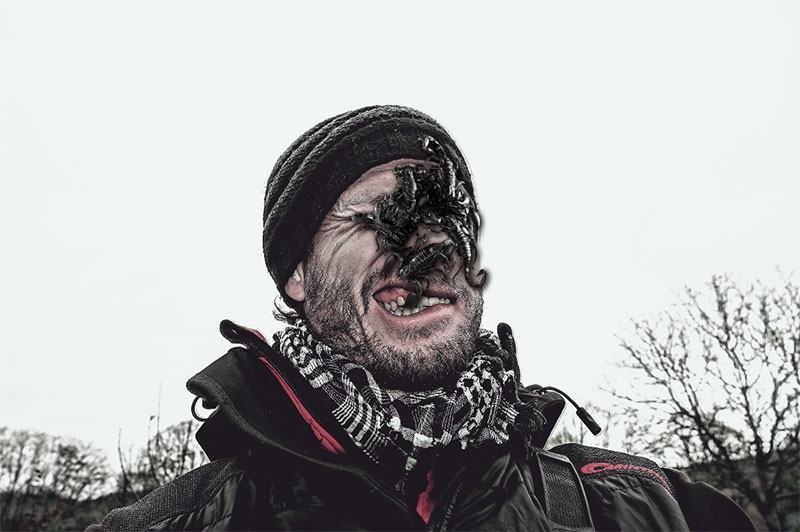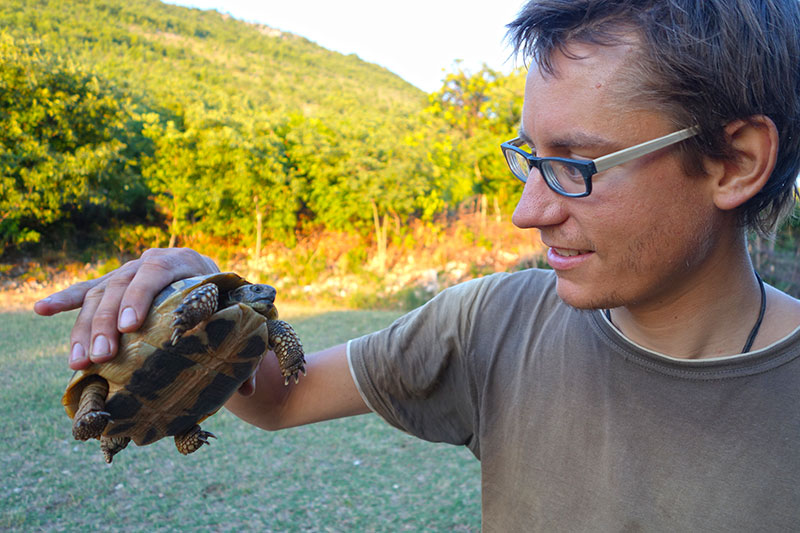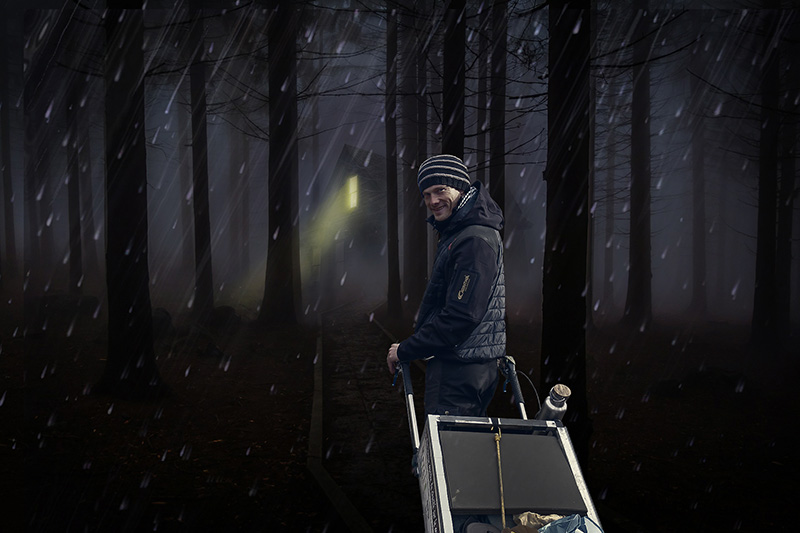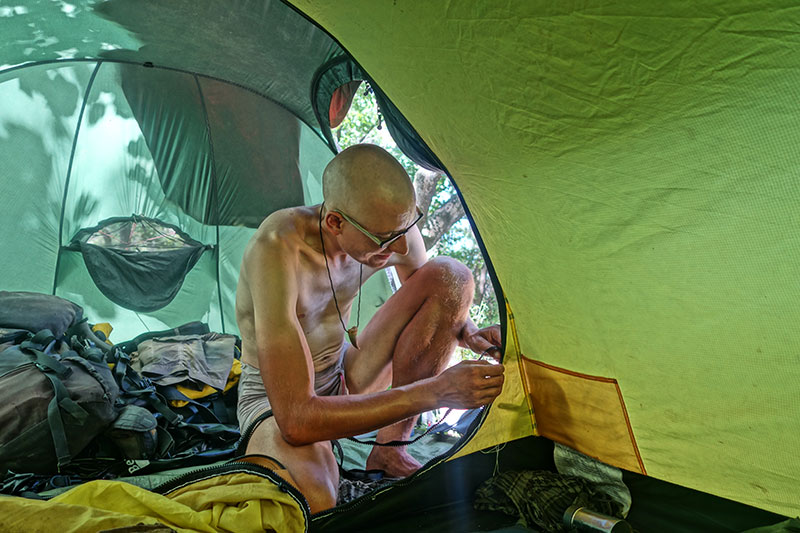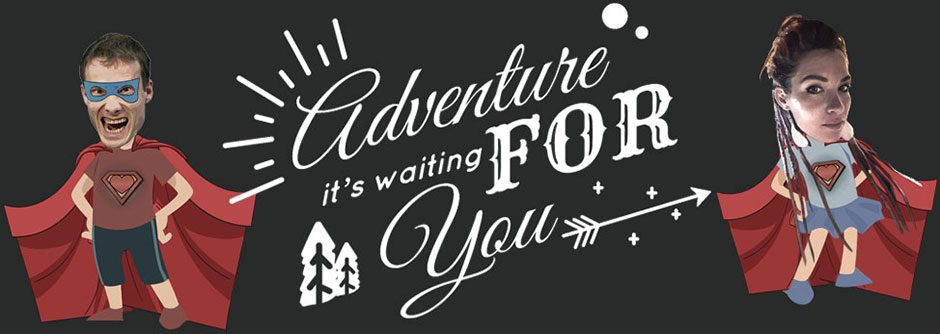Becoming a survival professional - that is what makes a good survival trainer!
Survival is the art of survival. It is the art of staying in control even in extreme situations and acting confidently and safely. Survival training used to be compulsory for the military, special units, expedition leaders, mountain rescuers and disaster relief workers. Today, however, survival and bushcraft have become more and more of a hobby and survival trainers are springing up like mushrooms. Many people are fascinated by the idea of being a survival professional. A person who is able to survive everywhere and under all conditions.
At the same time, confidence in our society has declined more and more. Today we have the feeling that our civilization will not exist for much longer. In view of what we can already perceive today about the destruction of our environment, these concerns are more than justified. It is therefore always a good idea to be prepared for anything. Being trained in survival also gives you a lot of freedom. A true survival professional is not only able to survive in extreme conditions. He can also live completely self-sufficiently in nature, without being dependent on civilisation. It is therefore no wonder that more and more people are looking for a good and capable survival trainer to train themselves as a survival professional.
Wie finde ich einen guten Survivaltrainer?
Unfortunately it is not easy to find a capable trainer here today. There are a lot of offers for survival training, survival courses, survival education, survival trips and survival travel, but how do you know what is good and what is not? Before we set off on our world trip, we ourselves worked for many years as survival professionals and survival trainers. Therefore we would like to share our experiences with you in this article. We will tell you what you should look out for when choosing your Survival Trainer. What different types of survival training are there? Which Survival Training is the right one for me. How can I distinguish a high quality survival course from a boring weekend in the forest? We will answer these and more questions in the following text.
What is a survival professional?
As the word suggests, a survival professional is someone who has perfected their survival skills. But what does that mean exactly?
Psychic Training
First of all, a survival professional must have gone through a strict mental training program. This is the only way he is mentally strong enough to withstand all adversities. He has repeatedly put himself in extreme situations in which he has faced death. He has experienced what extreme cold, extreme hunger, extreme thirst and extreme heat mean. He has learned to be the concentration, attention and will to survive even when he is bitten by thousands of mosquitoes. His spirit always dominates his body. For this reason he can still perform at full power even when he is already completely exhausted, hungry and exhausted.
A large part of survival training, therefore, consists of getting to know yourself with all your dark sides. This is especially important because it is not uncommon for you to be your own worst enemy.
What does that mean? Here's an example:
The fight against the own psyche
In one of our survival courses we once had two young men as participants, who were in top physical shape. They were convinced that they could lift and master everything. Every morning they jogged several kilometres and there was not a single evening they didn't finish with a workout. The two men were correspondingly athletic and well-trained. But unfortunately this alone did not say anything about their ability to survive. Because it was their psyche that drove them completely into despair after only a few hours. The two had booked a course with the title "Exposed in the wilderness - surviving with nothing". This meant that they had no equipment with them except a hunting knife and their clothes. The training took place in summer and it was a hot, sunny day.
fear of dying of thirst
We had hardly walked two hours through the forest when they felt that they were very thirsty. They realized painfully that they had no water bottles with them. "Oh my God! We are going to die of thirst!" cried the first of you. No sooner had he expressed this thought than his colleague was seized by panic. It did not last half an hour and they had the first symptoms of dehydration. They became dizzy, their mouths were dry and their tongues began to swell. Their ability to concentrate read off extremely. In their minds there was only one thought left: "How do we get water now?" They no longer paid attention to their path, lost their orientation and shortly afterwards sat in despair in the middle of an environment that was alien to them.
What had happened?
The thoughts form the reality
The real situation had in no way been difficult or problematic. You were in the middle of a cooling forest, which was full of clean creeks. To follow one of them back to its source would have been easy. Besides, they had only given up fresh water for 3 hours. At home at work it happened that sometimes they spent 8 hours in a hot, stuffy office without drinking a single sip or even thinking about it. The only difference was that in the office they felt they could drink any time they wanted to. Here in the wilderness, however, they thought they would be without water for the rest of their lives. So it wasn't the situation that put them in danger, it was just their own fear and their thought concepts. But that was not all.
Blind spots become visible
Now, as they were sitting on the floor, completely lost and desperate, suddenly all those feelings came up in them that they had always suppressed in everyday life. One of them had been afraid for years that his wife was cheating on him with another man. Also to his son he had almost no contact anymore because of all his work. He always told himself that he was a good father and husband, because he brought home the money diligently. He never wanted to admit that he was emotionally completely left behind.
His colleague was not much better off. He had recently been promoted and pretended to be incredibly happy. In reality, however, he had been promoted to a position where he was no longer allowed to do anything of what he had valued so much in his profession. His only task was to check his colleagues, who had once been his friends, to see if they were working effectively and profitably enough. If he found that this was not the case with one of them, he had to resign. He then hired a new, low-paid, cheap employee who was little more than a slave to the company. While on the outside he appeared to be a happy businessman, on the inside he was torn apart by guilt.
Thought Spirals of Negativity
All this guilt gave him now the feeling that he did not deserve to survive survival trip. His psyche told him that he would die here in the forest and that he deserved exactly that. Nobody would miss him. Everyone was just happy that this slave driver was finally gone. Such emotional outbursts, which make grown men start to cry and sob, are no exception. They are part of the process of survival training. Anyone who faces extreme situations of deprivation, fear of pain or effort will take a deep look into their mental morgue. This is an important part of the training, because through such steps we succeed step by step to come to terms with ourselves.
Coming to terms with trauma
Bereits seit unserer frühsten Kindheit haben wir immer wieder Situationen durchlebt, die uns stark traumatisiert haben. Sie haben Ängste, Blockaden und Neurosen in uns erzeugt, die wir im Alltag nur zu einem kleinen Anteil wahrnehmen. Wir sind es gewohnt, uns Strategien zu überlegen, mit denen wir innerhalb der Zivilisation zurechtkommen, ohne uns je selber kennenlernen zu müssen. Doch was passiert, wenn wir in eine extreme Situation geraten, ohne dass wir über unsere Schattenseiten Bescheid wissen? Noch ehe überhaupt eine reale Gefahr für uns auftaucht zerbrechen wir bereits an unserer eigenen Psyche.
Father and mother of Survival
This is why it is so important that we start early to confront our psychological issues. Only then can we build the mental strength to become a survival professional. Tom Brown Jr., one of the most famous survival professionals of the 20th century, said that there are two things that every survival professional must have: the right attitude and the right skills. He referred to these two things as the father and mother of survival.
Mental flexibility
So, coming to terms with one's own psyche is the first part for the right attitude towards survival in extreme situations. The second part relates to mental openness and flexibility. Being a Survival professional means always being creative and being able to improvise. Everyone can handle situations that they have already lived through many times and for which there is a kind of schedule in their mind. However, a Survival Professional must be able to handle situations that are completely new to him. This is only possible if he can easily adapt existing knowledge and apply it to the new situation.
Of course, there are many different example scenarios and corresponding sample solutions. You will get to know and play through these in the different Survival courses. But they have nothing to do with reality. Because no matter how much you train and how many situations you handle in your mind, the real situation will always look different. So the art is to develop a routine in being able to handle new situations without any problems. The ornament of the various survival scenarios that you experience in your training is therefore not to prepare for these example situations, but above all for all for all those situations that you have not yet thought of.
Constant training
For this reason it is impossible to become a Survival professional by attending a Survival course every now and then. Even a complete survival training over several weekends or over a whole year will not make you a Survival Professional. It can only lay the foundation on which you can then build through your own intensive training. In this respect, Survival is a sport in which you can only get better through constant training. No one would claim to be a tennis pro just because they have booked a weekend training with a tennis coach.
The fight against loneliness
And finally, there is another, psychological aspect, which unfortunately is completely ignored far too often. The problem is that when we think about survival and survival situations we usually don't even think about him. He seems completely insignificant to us and yet he often brings the greatest survival experts to their knees. We are talking about LONELINESS!
Permanently available distraction possibilities. In our society we are almost no longer used to being alone with ourselves even for a short moment. Even as singles in our own apartment we always have a TV, radio or computer with us, which keep us busy and distract us from ourselves. Survival situations are often also situations of loneliness.
Lonely together
But even if we get into such a situation with a group or together with friends, it does not mean that we cannot feel very lonely after a short time. Because the deeper we penetrate into our own psyche, the less we have the feeling of being understood by others. We don't want to admit to ourselves that it is our own psychological issues that are just getting us down, so we usually project our issues onto others. In the Wilderness School scene, the phase where this process is at its strongest is often called the "everyone else is stupid" phase.
It feels like being the only normal one among a bunch of completely crazy people. At least until this conviction changes and you are convinced that you have more problems than the rest of the world put together. This emotional roller coaster usually leads to the fact that you can feel completely alone and lonely even within a group.
Crazy with loneliness
The feeling is even more intense when you are really alone. I myself experienced this once during a project where I spent a hundred days wandering through Europe as a Stone Age man. Over long distances I was accompanied by friends, my family, my girlfriend at that time or other travellers. But there were always sections where I covered great distances completely on my own.
In the first moments I was happy about it every time. I had my peace and quiet, could walk in my own beat, could ponder my thoughts or just hum a little song to myself. But already after one or two days I felt how the loneliness drove me more and more crazy. Finally I even painted a smiley on my right foot and called it Fridolin, just to have a conversation partner. And believe me, we had very long and intense conversations.
The danger behind loneliness
Loneliness is something that can take away your will to survive. Suddenly you feel yourself as a being thrown into a huge unmanageable world without any reference. This makes it easy for you to feel that your life is meaningless and aimless, so that you are no longer sure why you should continue living at all. In extreme cases this can become a much greater danger than cold, hunger and thirst together. Especially when cold, hunger and thirst are added to it.
A firm faith helps
This is also one of the reasons why many people find faith in such extreme situations. The question is often not so much whether there is a greater power that helps us, protects us and guides us. In these moments it is much more a question of whether there is something or someone there with whom we can talk in the first place. To know that you are connected to God or whatever power means that you are not alone.
alone vs. be alone
It is important to understand that it is not about whether you are alone in a situation or not. Being alone is not dangerous. The question is whether you feel lonely. So it is never about whether you have a real person next to you and whether this person is human or not. It's about maintaining a connection to the outside. It's about feeling like you can communicate with someone else. It doesn't matter if it's a human travel companion, a dog, a smartphone, Jesus, a deceased ancestor or a smiley face on your own foot. The only thing that matters is that it is a connection to something or someone that you care about and that you give a certain power to. You must be able to take it seriously and believe in it. Because otherwise you are pretending to yourself and you will continue to feel lonely.
Everything is interconnected
During my visits to the most diverse primitive peoples, I have observed time and again that the locals were not in the least aware of the problem of loneliness. When I asked them about it, they just laughed and said: "Loneliness? How is that possible? You are constantly surrounded by thousands of friends and connected to each one of them. Every creature and every being in the forest is connected to us. Mother Earth is connected to us. We are a part of her and we are a part of the whole universe! So it is completely impossible to be lonely."
Recognizing that all is one
It's true! Once you understand that everything is one and that we are always connected to everything anyway, then we can no longer feel lonely. Unfortunately, we have learned something else all our lives. We have learned that we are individual, separate, lonely beings who exist independently of each other. Through this we create a blockade or a wall in our heads, which creates loneliness where there is none. This is probably also one of the reasons why we are so addicted to the distraction of media in our everyday life. So if we want to learn how to survive in nature without these addictive substances, we also have to deal with the feeling of loneliness. Only if we manage to be alone without feeling lonely can we become a true survival professional.
Learning skills and abilities
So now we have dealt with the mental and spiritual aspects of Survival. Let's now take a look at the second area that Tom Brown has declared indispensable: the right skills.
Survival professional - at home in the unknown
The thing that distinguishes a survival professional from a beginner in this field is therefore above all the ability to feel comfortable and at home in the unknown. What does this mean?
Different learning zones
When we get into a new situation, we automatically leave our comfort zone. This means that we enter an area where we are no longer sure how things work. We can no longer assess exactly how situations are going to work and therefore run the risk of making mistakes. This state is our learning zone. As long as we are in our comfort zone, learning is almost impossible, since we can already learn everything there is to learn. Only when we enter a new, unknown situation can we develop and learn something new. However, if we move too far into an unknown situation, so that we don't know how to deal with it, we get into the so-called "panic zone". Here we are now completely caught up in our fear, so that again no more learning is possible.
Most survival situations ensure that an untrained person immediately falls into the panic zone. A survival professional, on the other hand, has learned to make the learning zone his own home. He therefore moves so often in unfamiliar terrain that this contact with the unknown becomes a habit for him. This blurs the boundaries between the three areas and puts him in a permanent state of growth in which he always feels safe and at home. The whole thing becomes clearer with an example:
Expansion of the comfort zone
As a small boy I was used to play in my parents' garden, so this was always a safe terrain for me. Later on my uncle used to take me out into the forest. At first this was a bit scary for me, as I did not know which animals were hiding here and if they might become dangerous. But after only a few days I felt as comfortable here in the forest as I had felt in our garden before.
So my comfort zone had extended to the native forest. At some point I had reached the point where I felt more at home in the forest than in my own home. For example, if I wanted to relax after a stressful day, I would get some sausages or steaks, go for a walk in the forest and make a campfire in a nice place. Of course I could have had a barbecue at home with my friends and I did that from time to time. But it was only really relaxing and restful when I was in the forest with my non-human friends. At some point the animals also knew me so well that they came to me and lost all shyness. Then it happened that a squirrel jumped on my stomach and cuddled up while I was taking a nap.
The process was similar when I travelled to Iceland, New Zealand and Thailand a few years later. Each time I came to an area that was completely unknown to me and which therefore made me feel insecure at first. But at the same time it also created tension and curiosity. So I set out to explore the unknown. And again my comfort zone extended to these regions.
Making home in the learning zone
Today I live as a world traveller and every day I find myself in a completely new, unknown place. Through this I have learned that I can also feel at home directly in the unknown. It now only takes a few minutes to settle in and then to set up my sleeping camp. From this moment on I feel at home in the new place just as I did as a child in my childhood room. And that's what becoming a survival professional is all about: Not being pushed into the panic zone by new, unknown and perhaps even seemingly hopeless situations, but knowing that you can master them and therefore still feel comfortable.
Attention: Do not confuse this with a feeling of false security! Being at home in the unknown or in the challenge does not mean sitting back and pretending that nothing can happen. It means being alert and attentive at all times and having the situation perfectly in view and under control. This is the only way to avoid sudden dangers that you are not up to, so that you end up back in the panic zone.


What does a survival professional need to feel at home in danger?
So let's summarize once again the most important characteristics and skills of a survival professional:
1. mental and emotional stability
A survival professional knows his dark sides, his fears, blockages, weaknesses and the spiritual corpses that lie hidden inside him. Therefore he is no longer afraid of being confronted with himself. He has already gained a lot of experience in dealing with the most diverse extreme situations and can therefore always remain calm and composed. An unknown disaster or accident situation does not put him in the panic zone, but in the learning zone, so that his body is put into full readiness to perform, but not into a state of fear-starkness.
2. being alone with yourself
The Survival Pro knows that he is always connected to everything. For this reason he will not get a "loneliness crisis" even after a long time without other people. He has a strong connection to his environment, to the plants, the animals, the stones, the earth, to himself and to the wholeness of the universe. From his own experience he also knows how to free himself from depression and negativity loops, if he should slip into them nevertheless.
The following books are very helpful for the beginning: [amazon box="3833842687" title="Der Feind in meinem Kopf: Stopp den inneren Kritiker" description="Wir sabotieren uns selbst - und damit ist es Schluss! In jedem Menschen sind zahlreiche innere Anteile aktiv und einige wirken wie echte Feinde: Sie treiben uns erbarmungslos an, kritisieren uns maßlos und machen aus jeder Kleinigkeit eine Katastrophe." ] [amazon box="3898833887" title="Die Kunst sich selbst auszuhalten - Ein Weg zur inneren Freiheit" description="Meist suchen wir lieber den Stress im Beruf und in der Freizeit als uns mit unserem Inneren zu beschäftigen. Denn es könnte ja zunächst unangenehm sein, was uns da begegnet – endlose, unproduktive Gedankenketten, fiktive Streitgespräche, Zweifel am Job, an Beziehungen oder an uns selbst." ]3. be able to assess oneself and the situation
With just a few glances he always gets a precise overview of the situation. He is a risk manager, which means that he always assesses exactly where a risk exists and when it is worth taking. He avoids risks that can be avoided. He also knows exactly how well his own abilities are developed in each area, so that he can assess exactly what is a danger for him and what is not.


Through many intensive exercises, such as persevering, buried in the earth, one gets to know oneself better and better.
4. to know how to react in extreme situations
Thanks to many exercises and test scenarios, the Survival Professional already knows how to react in dangerous situations, under stress and in extreme cases. He knows where his fears can get in his way and he has already developed strategies to deal with them.
5. attention, vigilance, powers of observation
One of the most important characteristics of a survival professional is his permanent vigilance and attention. Even when he is completely relaxed, his senses are calibrated to alert him to any danger, no matter how small. In this respect, he is like a deer comfortably standing and grazing in a clearing. It is calm and relaxed, yet attentive. The slightest crack in its surroundings or a short sound of a bird is enough and it disappears in one sentence. It is able to do this because it is always aware of the possibilities of escape. As a survival artist, it also knows the language of the forest or its surroundings. He therefore always knows exactly which signs, sounds and signals indicate potential danger and which he can safely ignore.
We ourselves have been searching for good books on this topic for a long time, but never found anything
we can recommend our own book:
[amazon box="3868828478" title="Die natürliche Heilkraft der Bäume" description="In vielen praktischen Übungen lernt man mit diesem Buch die Kunst der Wahrnehmung, des Heilens und Erschaffen, so wie es die Kinder in verschiedenen Naturvölkern lernen." ]6. talent for improvisation
Perhaps the most important characteristic of the Survival professional is his talent for improvisation. Anyone can cope with difficult situations if they are well prepared for them. The survival professional, on the other hand, still feels comfortable even when there is no preparation, no suitable equipment and no ready-made plan for a new situation. He is like McGyver in this respect. That means he can estimate in a few seconds which things in his environment could be helpful if they are combined in the right way. He always finds new solutions for every problem, even when almost all paths seem to be blocked.
Here is a book to help you develop your improvisation talent: [amazon box="3864704308" title="Survival Hacks: Draußen überleben mit Alltagsgegenständen" description="Survival-Experte Creek Stewart zeigt in diesem Buch, wie man alltägliche Gegenstände in wertvolle Lebensretter verwandelt." ]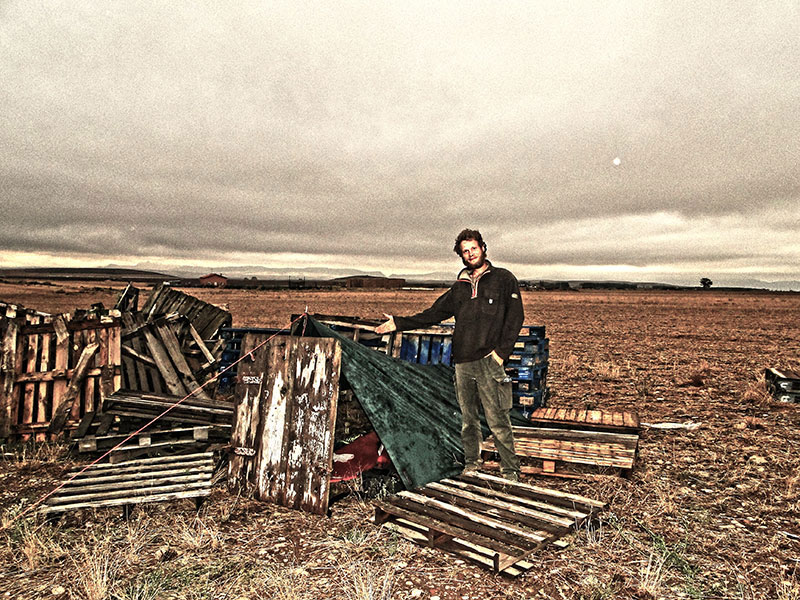

As a talent for improvisation, a survival professional can turn anything into an emergency shelter for farmers...
7. physical fitness
In order to be able to handle extreme situations at all, a survival professional needs good physical fitness. It doesn't help to know theoretically how you could survive a situation if you collapse physically after a few hours and are completely exhausted. This means that he needs both strength to literally "lift" things when necessary. As well as endurance, toughness, stamina and a good ability to react.
The following books have already served us very well on our journey: [amazon box="3742304119" title="Fit ohne Geräte: Trainieren mit dem eigenen Körpergewicht" description="Mit seinem Weltbestseller Fit ohne Geräte, der in 12 Sprachen erschien und sich weltweit millionenfach verkaufte, wurde der ehemalige Militärausbilder Mark Lauren quasi über Nacht zu einer Fitnessikone." ] [amazon box="3863559800" title="20 to Shape – Bodyweight only" description="Ganzheitlich, funktionell und natürlich - so beschreibt der Personal Trainer Ralf Ohrmann sein Trainingsprogramm. Dafür benötigt es kein teures Fitness-Studio und keine Geräte, der eigene Körper reicht." ] Shania is also enthusiastic about these books: [amazon box="3742308556" title="Fit ohne Geräte für Frauen: Trainieren mit dem eigenen Körpergewicht" description="Mit seinem Trainingsprogramm Fit ohne Geräte hat Mark Lauren eindrucksvoll bewiesen, dass wir keinerlei neumodisches Equipment benötigen, um in kürzester Zeit topfit zu werden." ] [amazon box="1095120441" title="Muskelaufbau für Frauen: Stark ist sexy" description="Straffe deinen Körper jetzt noch leichter und erreiche deine Ziele noch schneller! Inklusive 3 Tage Trainingsplan" ] The following apps also help us to integrate a daily workout into our time structure: 30 days Fitness Challenge (all-round fitness program, ideal for beginners and to become generally more athletic and stronger) Sixpack in 30 days (Super Ab Training App) Arm training (good motivation training to adapt the spaghetti arms to the strong legs again) Learn to do the splits in 30 days - stretching exercises (ideal if you have problems with shortened leg muscles due to the many hikes Stretching exercises - flexibility training (good training to relieve tension and generally become more flexible)8. knowledge about his environment
An old wisdom says: I cannot use information that I do not have. This means that the less I know about a situation, the more difficult it is to improvise successfully in that situation. For example, if I find myself in a familiar region after a plane crash, it is relatively easy for me to deal with the situation. I know the animals and plants, can assess the weather and perhaps even have geographical knowledge. I know which plants I can eat and where which animals live. I know what natural hazards are present and what materials I can use for a fire or shelter. Just knowing about edible wild plants can save me a lot of suffering by not having to starve now, although there would be plenty of food around me, which I just don't recognize as such.
Here we have compiled a list of the best books about Central European nature: Herbology: [amazon box="3440139654" title="Was blüht denn da? " description="Pflanzenbestimmung mit dem Standardwerk – seit 80 Jahren. Bestimmen Sie ganz einfach über 870 Pflanzen – mit der bewährten Einteilung nach Blütenfarbe und den mehr als 2.000 naturgetreuen Farbzeichnungen." ] [amazon box="3800182971" title="Taschenatlas Knospen und Zweige: 270 Gehölze im Winter bestimmen" description="Im Winter unbelaubte Gehölze bestimmen ist eine leicht erlernbare Kunst: Mit diesem Buch und einer Lupe können Sie 270 Bäume und Sträucher problemlos an Ihren Knospen und Zweigen erkennen." ] [amazon box="3038008869" title="Essbare Wildpflanzen Ausgabe: 200 Arten bestimmen und verwenden" description="Die 200 häufigsten essbaren Wildpflanzen: zu jeder Pflanze die grundlegenden botanischen Angaben sowie die wichtigsten Erkennungsmerkmale in detaillierten Illustrationen und Farbfotos." ] [amazon box="3494017190" title="Grundkurs Pflanzenbestimmung: Eine Praxisanleitung für Anfänger und Fortgeschrittene" description="Mit Hilfe dieses Buches gelingt es, nicht nur die ca. 700 häufigsten Pflanzenarten schnell und einfach zu bestimmen, sondern auch mit umfassenden Florenwerken wie dem „Schmeil-Fitschen“ perfekt umzugehen. " ] [amazon box="3800153726" title="Taschenatlas Giftpflanzen: 170 Wild- und Zierpflanzen im Porträt " description="Dieser Taschenatlas beschreibt 170 Giftpflanzen im Porträt. Einfache Symbole und detailgenaue Fotos ermöglichen eine exakte Bestimmung." ] [amazon box="3835415573" title="Bäume und Sträucher: Bestimmen in drei Schritten" description="Einfacher geht’s nicht: Bäume und Sträucher sicher bestimmen – auch ohne Vorkenntnisse! Nur drei entscheidende und unverwechselbare Merkmale checken. " ] [amazon box="3835406647" title="Farne, Moose & Flechten" description="Kompakt, übersichtlich, handlich – ideal für botanische Laien · Farne, Moose, Flechten, Schachtelhalme und Bärlappgewächse: die häufigsten und auffälligsten Arten." ] Mycology: [amazon box="3440149838" title="Welcher Pilz ist das?" description="Der umfassende Pilzführer ermöglicht schnelle Orientierung durch den praktischen Bestimmungsschlüssel nach Pilzgruppen." ] [amazon box="xxx" title="Einfach sicher Pilze sammeln: Speisepilze & ihre giftigen Doppelgänger" description="Vergleichen, ausschließen, zweifelsfrei bestimmen: die 50 beliebtesten Speisepilze. Doppelseitenprinzip: links der Speisepilz im ausführlichen Porträt, rechts seine drei wichtigsten Doppelgänger mit Verwechslungsmerkmalen." ] Animal lore: [amazon box="3440151832" title="Welcher Vogel ist das?" description="Der Kosmos-Naturführer zur Bestimmung von über 440 Vögeln aus ganz Europa. Durch den Kosmos-Farbcode ist die schnelle Orientierung garantiert." ] [amazon box="383102992X" title="Vögel in Europa: Über 500 Arten mit Vogelstimmen-CD" description="Mit diesem verlässlichen Handbuch bleibt kein gefiederter Freund mehr unbekannt! Über 1.800 Farbfotos, 400 Illustrationen und eine CD mit 99 typischen Vogelstimmen erleichtern das Bestimmen." ] [amazon box="3494016739" title="Die Vögel Mitteleuropas im Flug bestimmen" description="Dieses Bestimmungsbuch schließt eine Lücke! Im Unterschied zu den zahlreichen Vogelbüchern, die in den Buchhandlungen anzutreffen sind, widmet sich dieses neue Bestimmungsbuch ausschließlich dem Aspekt, die Vögel in Aktion – also in fliegender Bewegung – anzusprechen und richtig zuzuordnen." ] [amazon box="3662497263" title="Amphibien und Reptilien" description="Als überaus erfahrener Herpetologe, dessen Wissen und Erfahrung in zahlreiche Fachbücher Eingang gefunden hat, ist Dieter Glandt prädestiniert, dieses fachlich fundierte und gleichzeitig gut verständliche Buch zu den Lurchen und Kriechtieren zu verfassen." ] [amazon box="3440152650" title="Die Schlangen Europas" description="Das Standardwerk mit allen Schlangenarten Europas, Nordafrikas und des Mittleren Orients. Jede Art wird ausführlich und mit mehreren Fotos vorgestellt." ] [amazon box="3440151425" title="Welcher Fisch ist das?" description="200 exzellente Farbfotos zeigen die 100 häufigsten Süßwasserfische Mitteleuropas in ihrem natürlichen Lebensraum. " ] [amazon box="3735917119" title="Tiere unserer Heimat" description="Unsere heimische Tierwelt ist trotz zunehmender Besiedlung noch von großer Vielfalt geprägt. In Feld, Wald und Flur, in Seen und an den Küsten leben Hunderte von kleinen und großen Arten." ] [amazon box="3440137384" title="Kosmos Wildtierkunde" description="In mehr als 280 Abbildungen und kompakten Texten informiert die „Kosmos Wildtierkunde“ über Erkennungsmerkmale, Vorkommen und Verhalten von 138 wild lebenden Tierarten sowie wichtige Aspekte ihrer Bejagung." ] [amazon box="3831023484" title="Wildtiere: 300 Arten entdecken und bestimmen" description="Dieser hervorragend bebilderte Bestimmungsband ermöglicht es Ihnen, viele wild lebende Tierarten Europas in ihrem natürlichen Lebensraum zu erkennen und zu identifizieren." ] Tracking: [amazon box="3835417614" title="Tier-Spuren" description="Alle Tierspuren: vollständig, übersichtlich, mit brillanten Fotos und Zeichnungen. Fährten, Fuß- und Fraßspuren, Losungen, Gewölle, Baue und Verstecke, Suhlen und andere Spuren." ] [amazon box="3891046898" title="Federn, Spuren und Zeichen der Vögel Europas" description="Dieser einmalige und beliebte Feldführer enthält eine Fülle von faszinierenden Informationen zu den Federn, Fußspuren, Nestern, Gewöllen, Fraßspuren und Schädeln der Vögel Europas. " ] Bird language: [amazon box="303800488X" title="Die geheime Sprache der Vögel" description="Es ist eine alte, fast schon vergessene Kunst, sich die wachen Sinne der Tiere und im Besonderen die der Vögel zunutze zu machen. Mit ihrem Gesang und ihrem Verhalten geben sie uns spannende und letztlich auch für uns selbst lebenswichtige Informationen über die feinen und tiefen Zusammenhänge in der Natur." ] Meteorology: [amazon box="3835418688" title="Die BLV Wetterkunde: Das Standardwerk" description="Das komplette Wetterwissen, einfach vermittelt. Alles über die Kräfte, die das Wetter machen. Umfassendes Grundwissen und Profitipps zur Wetterbeobachtung und zur eigenen Wettervorhersage." ] [amazon box="3825246035" title="Meteorologie" description="Das Standardwerk jetzt in der 8. Auflage! Seit über 30 Jahren fortlaufend aktualisiert bietet dieses Buch eine hervorragende Einführung in die Meteorologie. Komplexe Zusammenhänge werden leicht verständlich dargestellt und durch Beispiele aus dem Alltag veranschaulicht." ] [amazon box="3884124870" title="Wetter auf See" description="Für alle, die sich auf dem Wasser bewegen, ist das Wetter einer der wichtigsten Faktoren. Segler und Motorbootfahrer müssen sich deshalb intensiv mit den Grundlagen der Wetterkunde beschäftigen. " ] [amazon box="3859024248" title="Wetterkunde: für Wanderer und Bergsteiger" description="hierdiebeschreibung" ]9. a wide range of useful skills
It's a simple calculation: The more skills and abilities I master, the better I am able to make my life comfortable. Let's assume that we are in the Canadian bush. If I can't do anything, it will probably be quite uncomfortable for me here. On the other hand, if I am able to make a fire, then at least I can keep cold nights and swarms of mosquitoes away from me. Of course, it is even better if I am able to start the fire without technical aids such as matches and lighters. Because then I will still be able to get along well even if I land here completely without equipment.
This does not mean that I cannot simply use a lighter if I have one. But I am no longer dependent on it. If I am also able to set traps or hunt in any other way, the probability increases that I can prepare a meal on my fire as well. And if I have a basic knowledge of cooking and grilling, it is likely that this food will taste good. So you will notice that the more skills you master, the more you are able to make a situation pleasant.
Here are some recommended books that you can use to improve your survival skills and acquire useful skills:
[amazon box="3730604406" title="Bushcraft 101 - Überleben in der Wildnis" description="Der Überlebenskünstler Dave Canterbury bereitet Sie perfekt auf Ihre Tour in die Wildnis vor und erklärt die wichtigsten Fertigkeiten, um die Ressourcen der Umgebung geschickt zu nutzen. " ] [amazon box="3730605046" title="Advanced Bushcraft - Überleben in der Wildnis" description="Dieser Guide verbessert Ihre Fähigkeiten, eigenständig dort zurechtzukommen, wo andere längst aufgegeben haben." ] [amazon box="3937872485" title="Das grosse Buch der Überlebenstechniken" description="Das große Buch der Überlebenstechniken beschäftigt sich mit dem Überleben in Extremsituationen, dem Überleben in der Natur und dem Überleben in der Zivilisation." ] [amazon box="xxx" title="Survival Basics: 365 Überlebenstechniken für den Ernstfall" description="Creek Stewart zeigt euch in 365 praktischen und leicht nachzumachenden Übungen, was alles möglich ist. Viele anschauliche Fotos sowie Links zu Videoanleitungen laden zum täglichen Üben ein" ] [amazon box="0062378074" title="SAS Survival Handbook: The Ultimate Guide to Surviving Anywhere" description="(Englisch) Umfassendes Grundlagenwerk zum Thema Survival mit vielen nützlichen Techniken." ]How do I become a survival professional?
Would you like to become a survival professional or a survival trainer yourself? No problem, we can help you with that. Just take a look at our other survival articles. For example, we'll tell you the important differences between a survival star on TV or YouTube and a survival expert in real life. We'll also show you the wide range of different survival training courses and how to find the one that suits you best.


